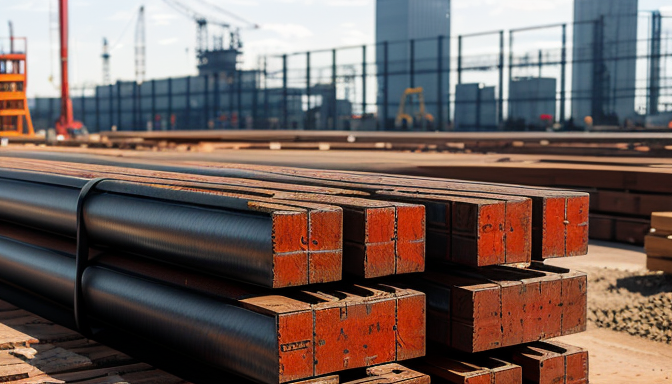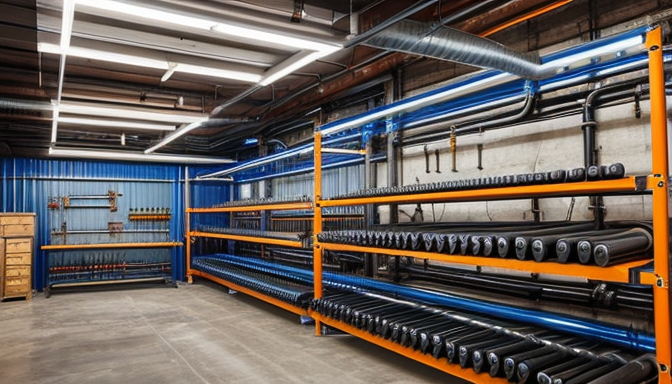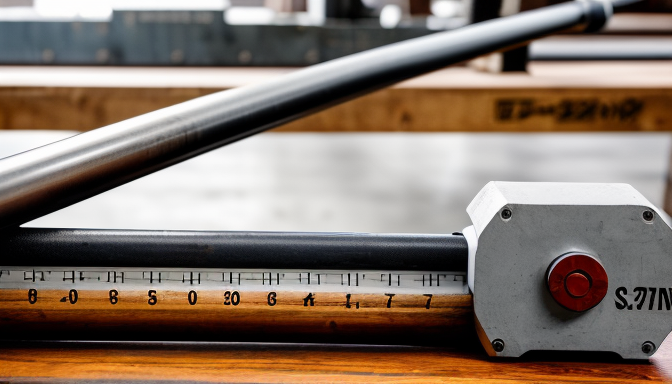When it comes to construction and industrial applications, S275NH steel pipes are a popular choice. But what exactly are they? Well, these pipes are made from a specific grade of structural steel, known for its strength and durability. This makes them ideal for various uses, from building frameworks to supporting heavy machinery. Imagine them as the sturdy backbone of a skyscraper or the reliable framework of a factory. They hold everything together!
One of the standout features of S275NH steel pipes is their ability to withstand harsh environments. Whether it’s extreme temperatures or heavy loads, these pipes are designed to endure. They are often used in construction, oil and gas industries, and even in shipbuilding. The versatility of S275NH makes it a go-to material for engineers and builders alike.
But hey, it’s not just about strength. The flexibility of S275NH steel pipes is another reason they are favored. They can be easily fabricated and welded, which means they can be tailored to fit the specific needs of a project. Think of them as a pair of jeans that can be adjusted to fit perfectly—comfortable, practical, and stylish!
In addition to their structural benefits, S275NH steel pipes are also cost-effective. They provide a good balance between price and performance, making them a smart choice for budget-conscious projects. But how do you find the right price for these pipes? That’s where understanding the market comes into play. Factors like size, thickness, and even the supplier can influence the cost. It’s always a good idea to shop around and compare prices to get the best deal.
Overall, S275NH steel pipes are a vital component in modern construction and industrial applications. Their unique combination of strength, flexibility, and affordability makes them an essential choice for builders and engineers. So, the next time you see a towering building or a bustling factory, remember the unsung hero behind it all—the S275NH steel pipe!
S275NH Steel Pipe Price
Understanding the pricing of S275NH steel pipes is crucial for budget planning in construction projects. Why is this important? Because knowing the costs helps you avoid surprises down the road. When it comes to pricing, several factors come into play. These include the size of the pipe, the thickness, and even the supplier’s location. Think of it like shopping for groceries—prices can vary depending on where you shop and what you buy.
On average, you might find S275NH steel pipes priced between $1.50 to $3.00 per kilogram. However, this is just a ballpark figure. The actual price can fluctuate based on market conditions and demand. For example, during a construction boom, prices might spike due to increased demand. It’s always a good idea to get multiple quotes from suppliers. This way, you can ensure you’re getting a fair deal.
Another factor to consider is the delivery costs. Depending on how far the supplier is from your project site, shipping can add a significant amount to your total expense. So, when budgeting, don’t forget to include these costs. A little planning can save you a lot of money.
Here’s a quick breakdown of what affects the price:
- Size: Larger pipes generally cost more.
- Thickness: Thicker pipes are more expensive due to the amount of material used.
- Supplier: Different suppliers may offer varying prices.
- Market Demand: Prices can rise or fall based on current demand.
In conclusion, knowing the price of S275NH steel pipes isn’t just about numbers. It’s about making informed decisions that can impact your project’s budget significantly. Always do your research and be prepared to negotiate with suppliers. After all, a little effort can lead to big savings!

S275NH Steel Pipe Weight
Understanding the weight of S275NH steel pipes is essential for anyone involved in construction or industrial projects. Why? Because weight affects transportation, installation, and overall project costs. Imagine trying to move a heavy steel pipe without knowing its weight. It would be a logistical nightmare!
The weight of S275NH steel pipes varies depending on their size and thickness. Generally, heavier pipes can be more challenging to handle, but they also offer greater strength and durability. To give you a clearer picture, let’s break down how to calculate the weight of these pipes.
Typically, the weight of a steel pipe can be calculated using the following formula:
Weight (kg/m) (π/4) × (OD² - ID²) × Density
Where:
- OD Outer Diameter
- ID Inner Diameter
- Density Density of steel (around 7850 kg/m³)
For example, if you have a pipe with an outer diameter of 100 mm and an inner diameter of 80 mm, you can plug those numbers into the formula to find the weight per meter. It’s a straightforward calculation, but it can make a big difference in your project planning.
Here’s a quick reference table that shows the approximate weights of commonly used S275NH steel pipes:
| Pipe Size (mm) | Weight (kg/m) |
|---|---|
| 50 | 4.1 |
| 75 | 7.5 |
| 100 | 11.5 |
| 150 | 16.5 |
As you can see, the weight increases as the size of the pipe goes up. This is crucial when planning transportation logistics. You wouldn’t want to overload a truck with heavy pipes, would you? It’s all about balance.
In conclusion, knowing the weight of S275NH steel pipes helps in making informed decisions. It impacts everything from shipping costs to installation methods. So, whether you’re a contractor or a DIY enthusiast, always keep an eye on the weight of the materials you’re working with!
S275NH Steel Pipe Properties
This article explores the essential aspects of S275NH steel pipes, including their pricing, weight, properties, sizes, and various uses in construction and industrial applications.
S275NH steel pipes are not just any ordinary pipes. They are crafted with a unique blend of properties that make them stand out in the construction and industrial sectors. You might be wondering, what exactly makes these pipes so special? Let’s dive into the details.
First off, the mechanical properties of S275NH steel are impressive. This steel grade is known for its high tensile strength, which means it can withstand a lot of stress without breaking. For instance, it typically has a yield strength of around 275 MPa. This is crucial for construction projects where safety and durability are non-negotiable. Imagine building a skyscraper; you wouldn’t want materials that buckle under pressure!
Next, let’s talk about the chemical composition. S275NH steel pipes are primarily made of iron, with a mix of carbon and other elements like manganese and phosphorus. This combination gives them excellent resistance to corrosion and wear. Here’s a quick breakdown of the typical composition:
| Element | Percentage |
|---|---|
| Carbon (C) | 0.17 – 0.20% |
| Manganese (Mn) | 1.20 – 1.50% |
| Phosphorus (P) | 0.04% max |
| Sulfur (S) | 0.05% max |
These elements work together to create a steel pipe that is not only strong but also versatile. But that’s not all! The benefits of using S275NH steel extend beyond strength and durability. For example:
- Weldability: S275NH steel pipes can be easily welded, making them perfect for various construction applications.
- Formability: They can be shaped and formed without losing their strength, allowing for creative designs.
- Cost-Effectiveness: Given their durability, they often prove to be a more economical choice in the long run.
In conclusion, the properties of S275NH steel pipes make them a top choice for many construction and industrial projects. Their high strength, excellent corrosion resistance, and versatility ensure they can handle the toughest conditions. So, whether you’re building a bridge or a commercial building, these pipes are worth considering. They truly embody the perfect blend of strength and flexibility, making them a reliable option for any construction need.

S275NH Steel Pipe Sizes
When it comes to construction and industrial projects, choosing the right size of S275NH steel pipe is crucial. The size can impact everything from structural integrity to cost efficiency. So, what sizes are available? Well, S275NH steel pipes come in a variety of dimensions to suit different needs. Typically, these pipes range from 1 inch to 24 inches in diameter, but custom sizes can also be produced based on specific project requirements.
Understanding the dimensions of these pipes is not just about the diameter. The thickness of the pipe walls also plays a significant role. Thicker walls can enhance strength but may also increase weight, which is something to consider during transportation and installation. For example, a standard S275NH steel pipe with a diameter of 6 inches might have wall thicknesses ranging from 0.5 inches to 0.75 inches. This variation can affect the pipe’s performance in different environments.
To help you visualize the different sizes, here’s a quick overview of some standard sizes and their typical applications:
| Diameter (inches) | Wall Thickness (inches) | Common Uses |
|---|---|---|
| 1 | 0.5 | Small structural applications |
| 4 | 0.5 | Piping for HVAC systems |
| 6 | 0.75 | Water and gas distribution |
| 12 | 1 | Heavy-duty structural support |
| 24 | 1.5 | Large-scale industrial applications |
These sizes are not just numbers; they represent the versatility of S275NH steel pipes in various sectors. For instance, in construction, a larger diameter pipe can be essential for load-bearing structures, while smaller pipes may be used for less demanding tasks. It’s like choosing the right tool for a job; the size matters!
In conclusion, when selecting S275NH steel pipes, consider not only the diameter but also the wall thickness and the specific requirements of your project. This attention to detail can make all the difference in ensuring a successful outcome. So, whether you’re laying the groundwork for a new building or upgrading existing infrastructure, knowing your options is key.
Frequently Asked Questions
- What is S275NH steel pipe used for?
S275NH steel pipes are widely used in construction and industrial applications due to their excellent strength and durability. They’re often found in structural frameworks, bridges, and various machinery components.
- How do I determine the price of S275NH steel pipes?
The price of S275NH steel pipes can vary based on factors such as size, thickness, and market demand. It’s best to compare quotes from multiple suppliers to get the most accurate pricing for your project.
- What are the standard sizes available for S275NH steel pipes?
S275NH steel pipes come in a variety of sizes to suit different needs. Common sizes range from small diameters of 1 inch to larger ones exceeding 12 inches, each serving specific applications in construction and industry.
- How can I calculate the weight of S275NH steel pipes?
To calculate the weight of S275NH steel pipes, you can use the formula: Weight Volume x Density. The density of S275NH steel is approximately 7.85 g/cm³. Make sure to account for the pipe’s dimensions and wall thickness in your calculations.
- What are the mechanical properties of S275NH steel?
S275NH steel boasts impressive mechanical properties, including high yield strength and good weldability. These characteristics make it an ideal choice for structural applications where strength and reliability are paramount.
- Is S275NH steel resistant to corrosion?
While S275NH steel has decent resistance to corrosion, it is advisable to apply protective coatings or treatments, especially in harsh environments. This ensures longevity and durability of the steel pipes in various applications.
